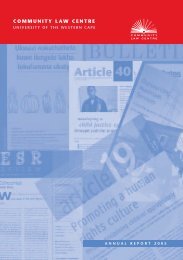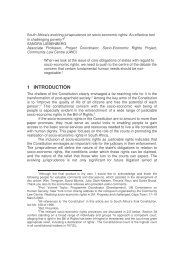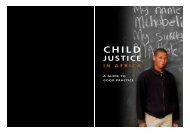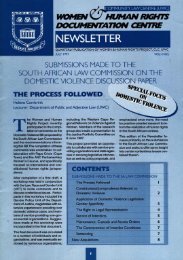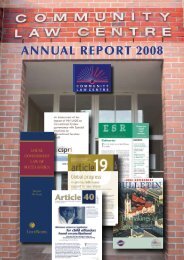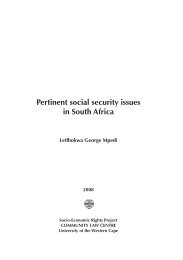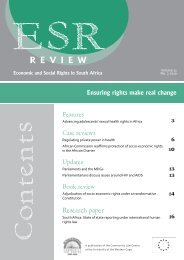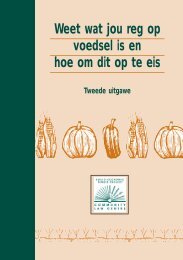printed version - Community Law Centre
printed version - Community Law Centre
printed version - Community Law Centre
- No tags were found...
Create successful ePaper yourself
Turn your PDF publications into a flip-book with our unique Google optimized e-Paper software.
AdvocacyThe Amicus team in the Constitutional Courtcase on the eviction of residents of Joe SlovoCentral to the <strong>Centre</strong>’s mission has been the advancement ofhuman rights by engaging with decision-makers through publicdiscourse and advocacy campaigns. The proximity to Parliamenthas meant that the <strong>Centre</strong> could regularly engage with legislatorson their functions of law making and oversight. Responding to theinvitations of Parliament’s various committees, the <strong>Centre</strong> has madenumerous written and oral submissions to the Portfolio Committeeson Justice and Constitutional Affairs, Local Government, SocialDevelopment, Health, Correctional Services and Safety and Security.While it is difficult and arrogant to claim impact, the <strong>Centre</strong>’s impactis evident in several pieces of legislation. In respect of some wehave been unsuccessful, but this has not dampened our interestand enthusiasm to continue our engagement with Parliament.Much of the advocacy work undertaken by the <strong>Centre</strong> involves building networks andissue-driven coalitions with a wide variety of NGOs and CSOs. For example, the introductionof the new child support grant in 1997 represented a major opportunity for advocacy arounda programme that had major implications for disadvantaged women and children. Workingwith a number of NGOs, the <strong>Centre</strong> helped spur public debate and the mobilisation ofcivil society. As a result, key aspects of the programme were improved to provide a moresubstantial safety net for poor children and caregivers. A further example is the coordinationrole that the <strong>Centre</strong> played with regard to the Child Justice Alliance, a network of over 400organisations and individuals who work towards the realisation of the Child Justice Act.Amicus curiae litigationGiven the Court’s role as final arbiter and enforcer of the Constitution, the <strong>Centre</strong> hassought to bring its expertise to bear directly on the development of jurisprudence. The firstengagement came in 1994, when Julia Sloth-Nielsen gave expert evidence in S v Williams, acase in which the Constitutional Court declared the whipping of juveniles unconstitutional.Breaking new ground, the <strong>Centre</strong> was admitted as a friend of the court in 2000 in the casethat resulted in the watershed Grootboom judgment. For the first time the Court heldunambiguously that the right to housing can be enforced, although in the circumstancesit means no more than the duty of the state to provide a policy to deal with the housingcrisis. The Court accepted a number of arguments based on international human rights lawraised by the <strong>Centre</strong>. Not satisfied with the Court’s jurisprudence, the <strong>Centre</strong> engaged theConstitutional Court again – albeit unsuccessfully – on the question of a core minimumcontent to socio-economic rights in the Treatment Action Campaign case. In the cases ofModderklip, Olivia Rd. Residents, and Joe Slovo Residents, all three dealing with evictions andthe right of access to housing, the focus was on remedies. The <strong>Centre</strong> was commended bythe Court for its instructive ad useful contributions.12COMMUNITY LAW CENTRE






